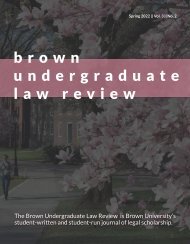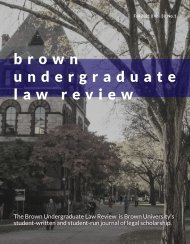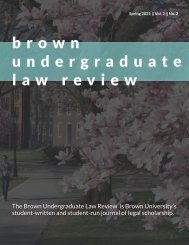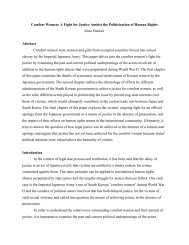Substantive Due Process: Dangerous or Necessary?
Carolyn Zech '24
Carolyn Zech '24
Create successful ePaper yourself
Turn your PDF publications into a flip-book with our unique Google optimized e-Paper software.
1868. While these attempts are noble in their intentions, their controversial nature has inhibited<br />
their success.<br />
To understand the <strong>or</strong>iginal intent of the Fourteenth Amendment, we must first begin with<br />
the Civil Rights Act of 1866. Immediately following the ratification of the Thirteenth<br />
Amendment, southern states began passing legislation hist<strong>or</strong>ically known as the “black codes.” 2<br />
These laws, publicly presented as benevolent acts to help guide African-Americans through their<br />
first years as free citizens, imposed heavy restrictions on their most basic freedoms—such as the<br />
ability to rent land <strong>or</strong> bear arms—and, most insidiously, often mandated that recently freed<br />
slaves “apprentice” f<strong>or</strong> their f<strong>or</strong>mer owners with only room and board as compensation. 3<br />
Congress passed the Civil Rights Act of 1866 as a response to these codes. The act established<br />
that all American citizens must be treated equally under the law, and that those in violation<br />
would be prosecuted by the federal government. 4 President Johnson, concerned about overly<br />
extending the federal government’s influence in state affairs, vetoed the act. Although Congress<br />
easily overrode his veto, radical Republicans remained concerned that Johnson, <strong>or</strong> future elected<br />
officials, would push to undermine <strong>or</strong> repeal the act. Just two months after overriding President<br />
Johnson’s veto, Congress passed the Fourteenth Amendment, which, upon its ratification in<br />
1888, solidified the basic principles of the Civil Rights Act in the Constitution and, by doing so,<br />
made it virtually impossible f<strong>or</strong> those principles to be effectively challenged. 5<br />
It is imp<strong>or</strong>tant to note that the Fourteenth Amendment is not an exact replica of the Civil<br />
Rights Act of 1866. Both provide f<strong>or</strong> equal protection under the law, but only the latter lists the<br />
exact rights that have that equal status, and only the latter goes as far as to explicitly establish<br />
that the relevant standard of equality is the one “enjoyed by white citizens.” 6 The relative<br />
ambiguity of Section I of the Fourteenth Amendment, which protects “privileges and<br />
immunities” and “equal protection under the law” without detailing exactly which privileges <strong>or</strong><br />
which laws are applicable, grants the judiciary broad license to guard practices they deem<br />
2<br />
Edward L. Ayers, "Reconstruction" in American Hist<strong>or</strong>y, 1493-1945, The Gilder Lehrman Institute of<br />
American Hist<strong>or</strong>y, New Y<strong>or</strong>k, 2015,<br />
http://www.americanhist<strong>or</strong>y.amdigital.co.uk.revproxy.brown.edu/Expl<strong>or</strong>e/Essays/Reconstruction.<br />
3<br />
Edward L. Ayers, "Reconstruction"<br />
4<br />
Civil Rights Act of 1866, ch. 31, 14 Stat. 27-30, 39 Cong., 1 Sess., (Apr. 9, 1866),<br />
https://www.loc.gov/law/help/statutes-at-large/39th-congress/session-1/c39s1ch31.pdf, 2.<br />
5<br />
Hist<strong>or</strong>y, Art & Archives, U.S. House of Representatives, "The Civil Rights Bill of 1866," November 16,<br />
2020, https://hist<strong>or</strong>y.house.gov/Hist<strong>or</strong>ical-Highlights/1851-1900/The-Civil-Rights-Bill-of-1866/.<br />
6<br />
CRA 1866, 27.










